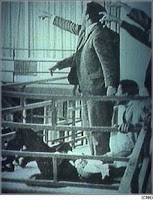In addition, some churches have given up backing the vocational missionary and have opted, instead, to partner with national churches. Rather than investing $100 a month into a North American family, they would prefer to use that $100 to support five national church planters. It’s a great deal more appealing to write a check for $1000 to build a church in Africa than it is to cough up a thousand bucks to help pay for a missionary's health insurance. This reality has created a shift in sending churches and agencies. No longer do donors invest in facilitating global outreach, embracing instead the latest trend -- franchising missions.

As the graph above indicates the difference between Franchisers and Facilitators is primarily a matter of time perception. Franchisers have a condensed perspective of mission involvement whereas Facilitators have an extended view of global outreach.
A typical franchising mission project: A local church meets a national through a short-term missions trip. The NAC “adopts” the people group or the national pastor as their project. The NAC claims they are now in partnership with the national church by funding church planters, orphanages and schools. The members of the NAC volunteer to go overseas and train national leaders for a week, provide crucial equipment (loud speakers, generators) for crusades and, provide funding for tracts and Bibles. Emotionally based, the Franchiser’s feel good that they are making a significant contribution in the Great Commission.
I am well aware that God is Sovereign and He can use the franchising method. But, as I’ve argued before, short-term gain based on missiologically weak practices can also cause more harm than good. I am also aware that every Franchiser believes their program is missiologically sound and that since buying into a franchise it has revolutionized their local NAC.
Why am I concerned about Franchisers? I recently returned from Kenya, where I lived and served for 14 years. The pastor of one of our churches told me about one of the graduates from the Bible Institute who went up north to work among Sudanese refugees. I challenged the church to support this man, that it was time for the Kenyan church to be senders of the Great Commission and not just recipients. They were enthused about the prospects, until they learned that a franchising organization in America had contacted this brother and told him they would take him on as “their missionary” and fully fund him. These Franchisers are not interested in the Facilitators who must run the Bible school, certainly not interested in working with any North American as they now only work with nationals. The Franchisers are not only shortsighted in their missiology, they have robbed the local church in Kenya from growing and being a part of global outreach.
I understand that not all Facilitators are missions strategic. Sadly, some facilitators are so pressured by the NAC franchising trend they are now creating their own ministry outlets to compete in the franchising market. Sending mission agencies have created so many franchising opportunities that they now recruit more people for short-term projects than they do career Facilitators.
“The world is thus,” they tell me. It’s the way it is, accept it. My answer is, “No, thus we have made the world.” Whether they are the national who lives in the villages of India, the native urban dweller working Santiago or, the North American who has committed himself/herself to learning language and culture in Tanzania, the Facilitator’s of this world will still be engaged long after the Franchiser has moved on to another project.


















